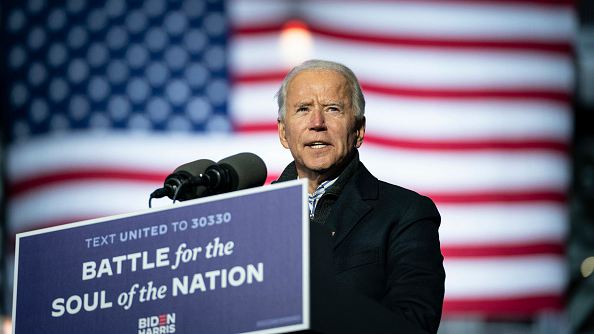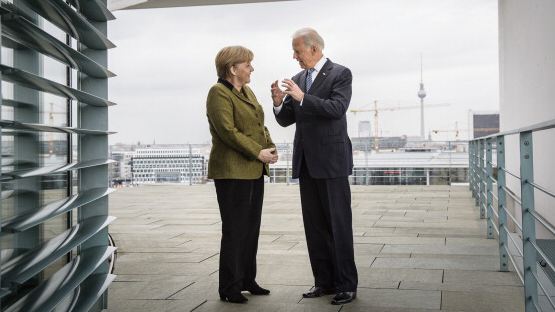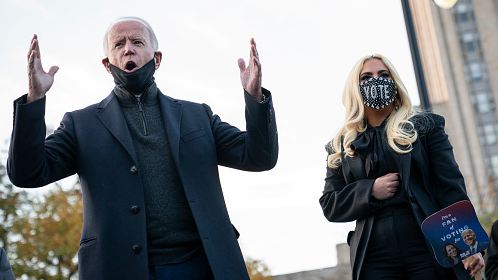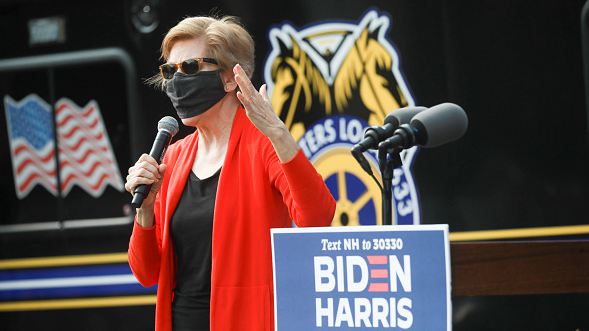If Joe Biden prevails over Donald Trump in the November 3 election, he'll be inaugurated as U.S. president on January 20, 2021 – but what would an administration led by the 77-year-old Democrat do?
The priority would be containing the COVID-19 pandemic, and the scope for major domestic policy thereafter would depend in large part on the battle for the Senate, the full results of which may not be known until after runoff elections expected in Georgia in January.
Senate battles that could make or break the next president
Four scenarios: How U.S. election night may play out
If the Democrats win a narrow majority, Biden will be able to pursue a number of his priorities; if the party wins a bigger majority, he could target a more radical policy agenda; and if the Republicans hold on, he may struggle to make a mark domestically.
Here are five factors to watch out for if Biden is elected:
1. COVID-19 containment and cash
The first step for a Biden administration would be attempting to get a grip on the COVID-19 pandemic, which has claimed more lives in the U.S. than in any other country, and shore up the economy.
The Democrat has proposed a nationwide mask mandate, a national testing and contact tracing and a stimulus package targeted at struggling Americans and small businesses.

Joe Biden speaks during a drive-in campaign rally at Heinz Field in Pittsburgh, Pennsylvania, November 2, 2020. /Getty
Joe Biden speaks during a drive-in campaign rally at Heinz Field in Pittsburgh, Pennsylvania, November 2, 2020. /Getty
A $2 trillion package put forward by the Democrats in Congress was rejected by Republicans pre-election, so passing a bill of the scale Biden is likely to want will require a Democratic majority in the Senate.
The former vice president has repeatedly stressed the importance of following the science and listening to scientists, and a completely different presentational approach to the pandemic is inevitable.
2. Rebuilding alliances, rejoining pacts
A president has freer rein in foreign affairs than domestic, and the former vice president is likely to attempt to rebuild alliances that have come under strain over the past four years.
He plans to sign the United States back up to many of the multilateral institutions and agreements Trump withdrew the country from, with numerous executive actions likely in the opening days of the administration as he seeks to reengage the U.S. with the rest of the world.

German Chancellor Angela Merkel speaks with then U.S. Vice President Joe Biden in Berlin, Germany, February 1, 2013. /Getty
German Chancellor Angela Merkel speaks with then U.S. Vice President Joe Biden in Berlin, Germany, February 1, 2013. /Getty
Biden has pledged to rejoin and resume contributions to the World Health Organization, rejoin the Paris climate deal "on day one" and may attempt to extend the New Start arms control agreement with Russia.
He has also said he wants to return the U.S. to the Iran nuclear deal if conditions allow, and is likely to quickly move to strengthen and repair relationships with traditional allies, particularly within NATO and the EU, and build new partnerships with developing nations.
3. New states and an expanded court?
Biden has a reputation as a moderate and his party has stayed united through the election cycle, but within it there are many divides that are likely to reemerge when voting ends.
The starkest split is between centrists and the progressives, and there's little doubt a President Biden would come under pressure to enact some radical changes to U.S. institutions – particularly if the Democrats win a strong majority in the Senate – from leading lights of the left like Representative Alexandria Ocasio-Cortez.

Alexandria Ocasio-Cortez waves during a food distribution event in New York City, October 27, 2020. /Getty
Alexandria Ocasio-Cortez waves during a food distribution event in New York City, October 27, 2020. /Getty
How willing Biden would be to use up capital before the 2022 midterm elections to enact long-held Democratic dreams is unclear, but options he could pursue include granting statehood to Washington D.C. and Puerto Rico, strengthening voting rights, overhauling the judiciary and scrapping the Senate filibuster.
He has said that he will set up a bipartisan commission to examine reform of the Supreme Court, which many in his party would like him to expand to counter the new 6-3 conservative majority.
4. Climate, health and economy
Climate change policy became an increasingly prominent part of the Biden message as the campaign entered the closing stages, and many of his policies are likely to have a green tint.
The Democrat has campaigned on a $2 trillion investment in green energy and rejoining the Paris climate deal, which the United States is due to exit on November 4. He has also said he wants the U.S. to have net zero emissions by 2050.

Joe Biden and Lady Gaga campaign at Schenley Park in Pittsburgh, Pennsylvania, November 02, 2020. /Getty
Joe Biden and Lady Gaga campaign at Schenley Park in Pittsburgh, Pennsylvania, November 02, 2020. /Getty
He also backs a $15 per hour minimum wage, reversing the majority of Trump's tax cuts, expanding healthcare, strengthening criminal justice, forgiving some student loans and putting a greater emphasis on buying American-made goods as well as committing billions of dollars to research on new technologies and artificial intelligence.
Big infrastructure spending is a possibility even if the Republicans hold the Senate, and the 77-year-old would attempt to use his decades of experience in Congress to try to win bipartisan backing.
5. Key appointments
Different wings of the Democratic Party will also have a close eye on who Biden nominates to key positions within his administration, with progressives pushing for important cabinet and White House roles.
The choice of chief of staff is likely to be an indication as to the direction of the presidency, with Ron Klain, who served in the role when Biden was vice president, among the favorites. Another top aide, Tony Blinken, along with former national security adviser Susan Rice, is among the names connected to secretary of state.

Elizabeth Warren stumps for Joe Biden in Manchester, New Hampshire, October 10, 2020. /Getty
Elizabeth Warren stumps for Joe Biden in Manchester, New Hampshire, October 10, 2020. /Getty
A number of defeated rivals for the Democratic nomination could also be given big jobs, probably dependent on the outcome of the Senate elections.
Elizabeth Warren has been linked with treasury secretary and attorney general, Bernie Sanders is reported to be lobbying to be labor secretary and Pete Buttigieg, a reliable surrogate for Biden, is expected to be offered a role.
Several Republicans are also reported to be under consideration as Biden looks to make good on his promises to bridge partisan divides, though the appointment of figures such as John Kasich would risk exacerbating Democratic divides.

